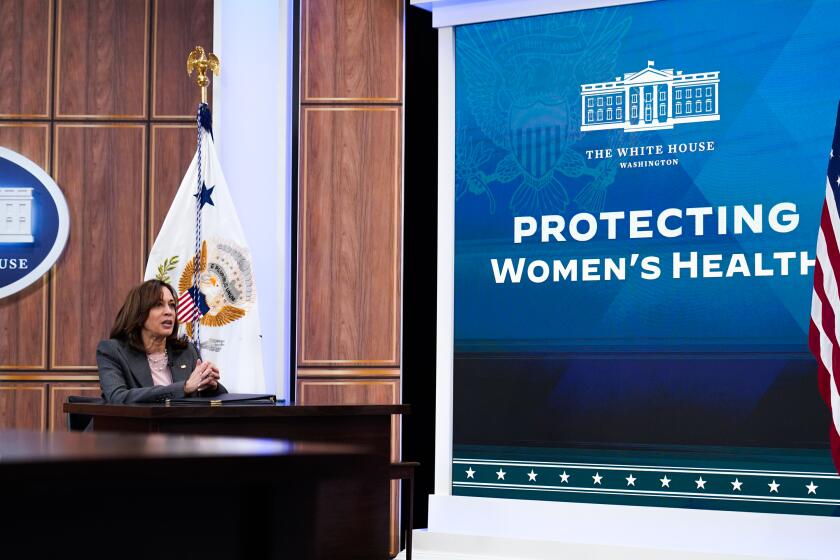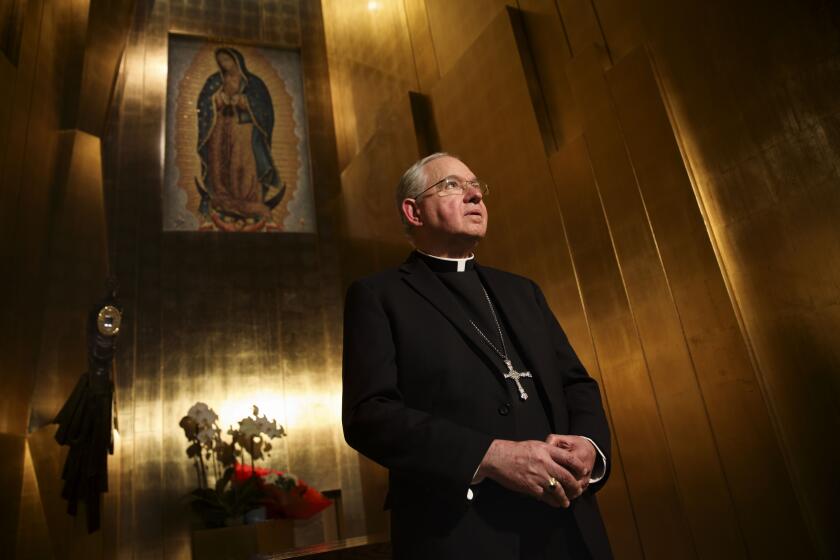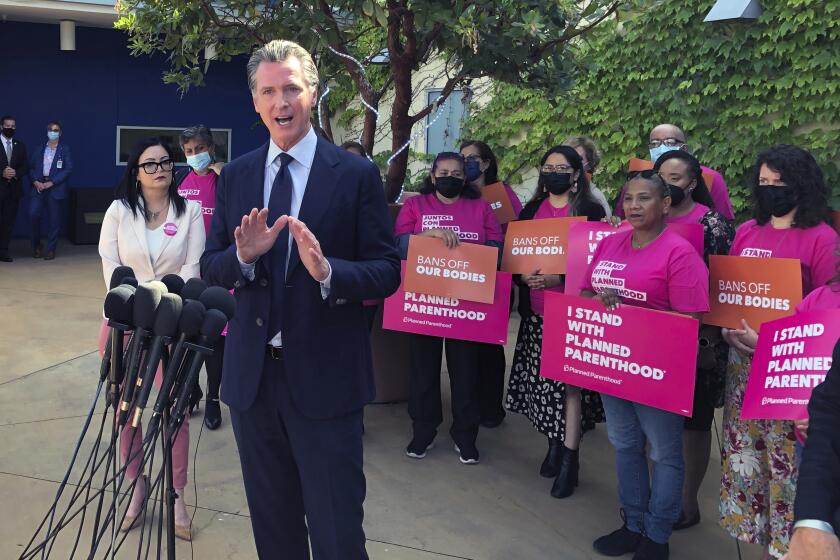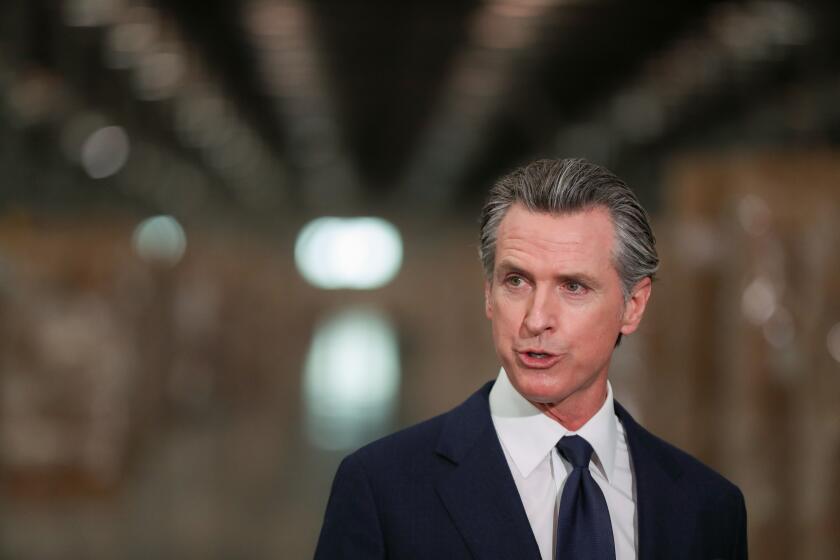San Francisco archbishop bars Rep. Nancy Pelosi from receiving Communion over abortion rights stance
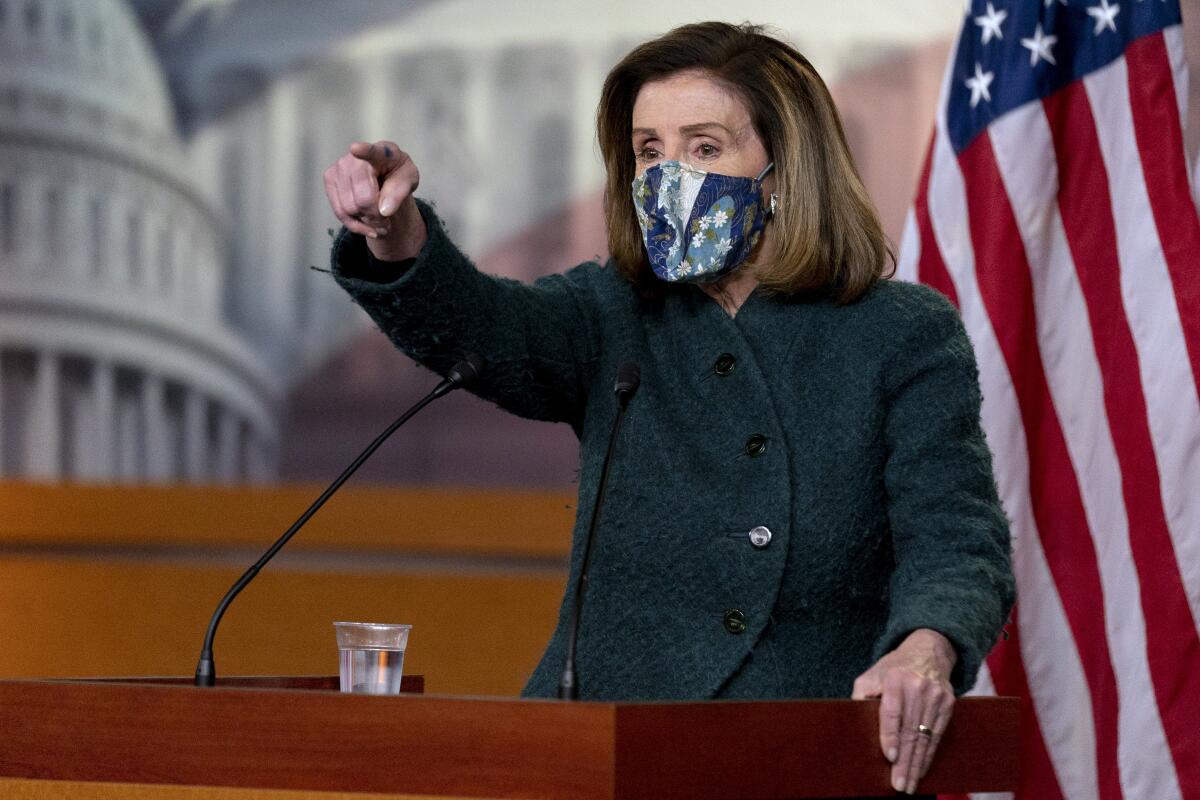
- Share via
A long-simmering dispute between San Francisco’s Catholic leaders and the city’s elected officials escalated Friday when a Bay Area archbishop took the extraordinary step of barring House Speaker Nancy Pelosi from receiving Communion over her support for abortion access. The move, occurring just as the U.S. Supreme Court appears poised to overturn Roe vs. Wade, underscores deep divisions among Catholics over the issue.
Archbishop Salvatore Cordileone told Pelosi in a letter Thursday that she had not offered “an accommodation to my many requests to speak with you again since you vowed to codify the Supreme Court’s Roe v. Wade decision in federal law” after a Texas law effectively banning most abortions took effect last year.
Cordileone said he had written to Pelosi in April warning her that he was prepared to bar her from receiving Communion.
“As you have not publicly repudiated your position on abortion, and continue to refer to your Catholic faith in justifying your position and to receive Holy Communion, that time has now come,” he wrote this week.
A spokesman for Pelosi did not respond to requests for comment.
Cordileone has challenged Pelosi over her abortion rights stance several times. In 2021, she responded by saying the two had “a disagreement about who should decide this. I believe that God has given us a free will to honor our responsibilities.”
“I keep saying to people who say things like that, when you have five children in six years and one day, we can talk about what business it is of any of us to tell anyone else what to do,” Pelosi added, according to the San Francisco Chronicle. “For us it was a complete and total blessing, which we enjoy every day of our lives, but it’s none of our business how other people choose the size and timing of their families.”
Kamala Harris says that if Roe falls, it will be the first time in at least five decades that Americans would have a right once promised taken away.
The leak this month of a draft Supreme Court decision that would overturn Roe vs. Wade not only reignited the dispute between the Catholic Church and San Francisco officials but also upended a midterm election cycle that is widely expected to favor the GOP.
Democrats believe the ruling could galvanize their voters and potentially flip some reliable Republican voters, especially women, according to polls and interviews. But it would also be likely to energize conservatives.
College-educated women, who tend to favor abortion rights, have been a critical voting bloc and could be pivotal in congressional races in affluent regions such as Orange County as well as in similar districts, such as in the suburbs of Atlanta and Phoenix.
Since the leak of the potential ruling, which would overturn the landmark 1973 decision that created federal protection for access to abortion, politicians on both sides of the aisle and interest groups have spent millions of dollars on television and digital ads focused on the issue.
Pelosi, who represents one of the most liberal congressional districts in the U.S., is expected by many to announce her retirement after she wins reelection, setting off an intra-party succession battle.
Though she has clashed with her party’s progressive wing, she has maintained firm control over the caucus and been largely successful at keeping members in line.
“She’s an 82-year-old woman who has been a devout Catholic her entire life,” said one longtime Pelosi observer who did not want to speak publicly before the speaker weighed in on Cordileone’s decision. “What we know is she is a person of deep faith who deeply believes in privacy rights and is likely to maintain her view that this is something between herself and her church, and not something she wants litigated in public by friend or foe.”
Eric Jaye, a veteran San Francisco Democratic consultant, said Cordileone “has been pushing ideological boundaries since the day he got here.”
Archbishop José H. Gómez has long exerted his influence on issues he feels passionately about, including immigration and abortion.
“He might be the archbishop of San Francisco, but he is not from San Francisco,” Jaye added. “I don’t think in any way what he does reflects the opinion of the majority of the community of the Catholic faithful here in San Francisco.”
Jaye, who worked on Pelosi’s first House race in 1987, recalled appealing to churchgoers during that congressional campaign.
“Her base of support was Catholic, and we made sure to be outside all of the Masses as they let out,” he said.
Harmeet Dhillon, an attorney who lives in the Russian Hill neighborhood of San Francisco and is one of California’s three representatives on the Republican National Committee, said that the matter was “between [Pelosi] and her church” but that Cordileone’s decision was appropriate.
“My response was ‘That’s right,’” Dhillon said. “That’s what the Catholic Church doctrine says, and she’s grossly out of step…. I don’t think this is unprecedented, as seen in the prior instruction from D.C. cardinals and what others say: People who advocate legislation that is pro-abortion are out of step with church doctrine.”
Jim Ross, a Democratic consultant who has worked in San Francisco politics for 35 years, suggested that Cordileone was attempting to use Pelosi’s name recognition and popularity in the city to draw attention to his message.
“Pelosi’s maybe three times, four times more popular than the archbishop and much better known,” Ross said. “He’s trying to use Nancy Pelosi to make a point around a woman’s right to choose. This is a publicity stunt.”
Ross, a lapsed Catholic, was also critical of the direction Cordileone has led the church in terms of its relationship with the city.
“The archbishop in San Francisco has not been relevant in civil life in years. He’s made a choice — that he wants to be in opposition to the civic and government life in San Francisco rather than find places of agreement. As somebody who’s a lapsed Catholic, who went to Catholic school, I found it disappointing that the archbishop hasn’t found a way to work with the city on things that they can work on together.”
The move is the latest salvo in the struggle between those within the church who believe abortion must be their preeminent concern and others who want to focus on a spectrum of issues such as poverty and social justice.
“Part of the challenge here is that it’s tremendously selective, what Cordileone is doing,” said Tom Poundstone, associate professor of theology and religious studies at St. Mary’s College of California in the East Bay. He also noted that Cordileone has praised Pelosi’s attempts to address poverty and other issues. “If I’m consistently pro-life, I need to certainly be pro-Black lives matter in that sense.”
The subsidies are included in a $125-million abortion services plan Newsom will send to legislators on Friday as part of his revised state budget.
Like much of the West Coast, San Francisco has roots in the Catholic Church and Spanish missions, Ross said, noting that the city has large Catholic communities of Irish, Italian and Latino families.
The city’s Old St. Mary’s Cathedral is among the oldest Catholic churches on the West Coast. Marilyn Monroe and Joe DiMaggio posed for wedding pictures outside Saints Peter and Paul Church after a civil ceremony (they could not have a church wedding because DiMaggio’s first marriage had not been annulled).
San Francisco was also home to what was once a large and influential parochial school system.
Ross noted that a common inquiry among native San Franciscans is, “Where did you go to school?”
“What they’re asking is not where you went to college,” he said. “They’re asking which parochial high school did you go to?”
Oil magnate Gordon Getty, former Gov. Jerry Brown, and retired Judge William Newsom, the late father of the current governor, attended St. Ignatius College Preparatory; Gov. Gavin Newsom attended Notre Dame Des Victoires for a few years.
The Catholic Church and San Francisco have sparred before.
In 2003, San Francisco elected officials objected to a Vatican statement that “allowing children to be adopted by persons living in [same-sex] unions would actually mean doing violence to these children,” according to the Chronicle.
The statement was called hateful, discriminatory, insulting and ignorant by San Francisco supervisors, the Chronicle reported.
When he was mayor of San Francisco, Newsom also faced backlash from some in the Catholic Church after allowing marriage licenses for same-sex couples in 2004. Newsom told the Chronicle that he fundamentally disagreed with church teachings on issues including same-sex marriage and abortion rights.
“A lot of my friends in the church were out there protesting me [over same-sex marriage] and I hardly feel comfortable going back into some of these churches,” he told the Chronicle, adding that he still took Communion, though he declined to say where.
Newsom and former Sen. Barbara Boxer were among commencement speakers targeted by a conservative Catholic group in 2004 for their views on abortion, same-sex marriage or the death penalty. Both were allowed to speak.
In Los Angeles in the same year, then-Cardinal Roger Mahony declined to punish politicians who supported access to abortion, saying that he favored educating them about the immorality of the medical procedure in the church’s view.
That same year, some U.S. bishops threatened to withhold the sacrament from Democratic presidential nominee John F. Kerry and others who supported abortion rights. Pelosi was among dozens of members of Congress who warned that efforts to withhold Communion “will revive latent anti-Catholic prejudice.”
Father Thomas Rausch, professor emeritus of Catholic theology and theological studies at Loyola Marymount University, noted that Cordileone’s move applies only to the Archdiocese of San Francisco. Cordileone has authority over dioceses in Northern California, Utah, Nevada and Hawaii, though it was not clear whether priests there would enforce his decision.
Pelosi would be able to receive Communion in other dioceses, Rausch said, but Cordileone’s “actions reflect the division in the American Catholic hierarchy.”
California’s Constitution includes broad rights of privacy but has no explicit protection for abortion services.
.
Although the Catholic Church strongly opposes abortion rights, the views of American Catholics are divided along lines that are similar to the rest of the country: A majority believes that abortion should be legal in most circumstances and opposes overturning Roe vs. Wade.
Nationwide, about 60% of Americans say abortion should be legal all (19%) or most (42%) of the time, while about 40% say it should be illegal with some exceptions (29%) or illegal in all cases (8%), according to a recent large-scale survey by the Pew Research Center.
The divide among Catholics is similar: 56% of Catholics say abortion should be legal in all (13%) or most (43%) cases, while 42% say it should be illegal with some exceptions (32%) or illegal in all cases (10%), Pew found.
The views of white and Latino Catholics are almost identical. Polling by the Public Religion Research Institute found that 59% of white Catholics say abortion should be legal in all or most cases, while 57% of Latino Catholics said the same.
For most Catholics, the church’s teachings are not key to their decision about abortion. About 4 in 10 Catholics say religion is either “very” or “extremely” important in shaping their views on abortion, Pew found. That contrasts with white evangelical Protestants, among whom 73% say religion is very or extremely important in shaping their views. Evangelicals are now the biggest force in the antiabortion movement.
“We have some bishops who insist on making abortion the preeminent moral issue faced by the church, and we have others who are personally against abortion but do not want to politicize the Eucharist,” Rausch said.
More to Read
Get the L.A. Times Politics newsletter
Deeply reported insights into legislation, politics and policy from Sacramento, Washington and beyond. In your inbox twice per week.
You may occasionally receive promotional content from the Los Angeles Times.
